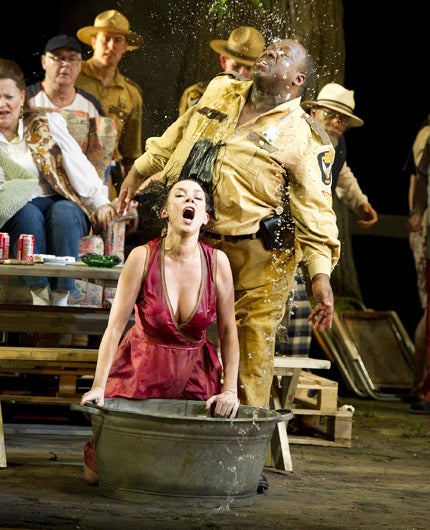Carmen, Grand Theatre, Leeds<br/>Budapest Festival Orchestra / Fischer, Royal Festival Hall, London
Baiting of a rough and ready gypsy vamp

Your support helps us to tell the story
From reproductive rights to climate change to Big Tech, The Independent is on the ground when the story is developing. Whether it's investigating the financials of Elon Musk's pro-Trump PAC or producing our latest documentary, 'The A Word', which shines a light on the American women fighting for reproductive rights, we know how important it is to parse out the facts from the messaging.
At such a critical moment in US history, we need reporters on the ground. Your donation allows us to keep sending journalists to speak to both sides of the story.
The Independent is trusted by Americans across the entire political spectrum. And unlike many other quality news outlets, we choose not to lock Americans out of our reporting and analysis with paywalls. We believe quality journalism should be available to everyone, paid for by those who can afford it.
Your support makes all the difference.Sexual humiliation is the engine of Daniel Kramer's Opera North production of Carmen. Bizet's gypsy vamp has driven many directors to distraction. Who is she? What does she represent?
To Kramer, who has jettisoned all things Spanish, though not all things Latino, in a staging that staggers under the scurf of contemporary Americana, she is Seville's Most Wanted, a lone insurgent against the tyranny of the male gaze. Look more carefully at the Good Ol' Boys of the garrison, however, and you can see that their main interest is each other.
Heroism and victimhood are inseparable in a production that, for all the trailer-park trappings in Soutra Gilmour's designs – the pizza boxes and pit bull terriers – still spins the same romance around Bizet's femme fatale. Breasts and teeth bared, nose bloodied, her light voice stripped and twisted into a mocking, cooing delivery, Heather Shipp's Carmen shivers and buckles with masochistic joy. It is difference that binds her fleetingly to Peter Auty's Don José, he more Momma's boy than shamed ex-con, collateral damage in the war of the sexes.
In his mustard-yellow shorts, the Boy Scout to Carmen's Betty Blue, Don José is the only man to recoil from the groin-grabbing, bum-groping, locker-room routines of the guardsmen. So hard do they find it to keep their hands off each other that Carmen is an essential outlet for tension, though lust is invariably expressed through violence. Scared and excited by her brush with the soldiers, Anne Sophie Duprels' crazed Michaela delivers the sort of kiss one would hope a mother would not send her son. No need for street urchins here, no cutesome children's chorus, for the adult populace is trapped in the polymorphous perversity of infancy. In this context, Kostas Smoriginas's louche, shell-suited, pit-bull-fighting lunk of an Escamillo is almost eligible. At least his agenda is plain.
Here, then, is a roughed-up version of Carmen: heavily edited by conductor Andreas Delfs and as misandrous as Kramer's Bluebeard's Castle was misogynistic. If you can swallow the concept, the crudeness and the cuts, the execution is superb. The immediacy and versatility of orchestral sound is impressive, the movement direction of the chorus thorough. Though Kramer's characterisations militate against lyricism, the principals should be commended for their commitment to such an extreme reading, while Auty's unravelling in Act IV is properly gut-wrenching.
More blush-inducing than Carmen, Ivan Fischer's performance with the Budapest Festival Orchestra marked Hungary's presidency of the European Union in the highest and lowest music from the Austro-Hungarian empire. From aristocractic Esterhazy, there were the teasing hiccups of Haydn's Oxford Symphony, from Budapest itself, Liszt's First Piano Concerto, soloist Stephen Hough's fingers a-blur over crystalline pedalling.
From Vienna, or the woods beyond, there was Beethoven's Pastoral Symphony, with a slender sapling placed in front of the podium, and flute, clarinet, oboe and bassoon nestled among the buzzing and lilting strings, producing textures of breathtaking intimacy. It takes chutzpah to follow this euphoric sacrament with a down-and-dirty reading of Brahms's Hungarian Dance No 21, and something close to madness to cap that with Strauss's Peasant Polka, but Fischer had us eating out of his hand. For the next six months, we're all Hungarian.
'Carmen' (0844 848 2706) to 11 Feb, then touring
Next Week:
Anna Picard sees Rolando Villazon's directorial debut, Werther, in Lyon
Classical Choice
Conductor Esa-Pekka Salonen begins his year-long survey of the work of Bela Bartok with the Philharmonia at London's Royal Festival Hall (Thu), and The Anvil, Basingstoke (Fri). Also at the RFH, peerless Italian pianist Maurizio Pollini launches the five-recital Pollini Project with Book 1 of Bach's Well-Tempered Klavier.
Join our commenting forum
Join thought-provoking conversations, follow other Independent readers and see their replies
Comments